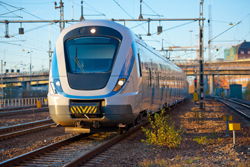Innovating the EU’s regional rail
Increasing efficiency and decreasing costs associated with the European railway system are an important way to increase rail usage and thus decrease greenhouse gas (GHG) emissions. Rail travel consumes much less energy per passenger than private car travel and, using low-carbon electricity, produces significantly less emissions per passenger that air travel for a given route. The European Rail Research Advisory Council (ERRAC) is the EC’s authority on rail research at the European level. It was established in 2001 as the centralised European body focused on revitalising the European rail network and fostering innovation to increase efficiency and decrease cost. As such, ERRAC published the Strategic Rail Research Agenda (SRRA) in 2007 that defined research goals through 2020. The EU-funded ‘ERRAC SSA’ (ERRAC SSA) project was developed to support all ERRAC activities (ERRAC Specific Support Action). It covered all types of conventional, high-speed and freight applications as well as urban and regional passenger services. One of the most important areas covered by ERRAC SSA was infrastructure and operations of regional railways, a sector lacking adequate data and whose research needs are minimally defined. Three important analyses were carried out regarding national activities and the SRRA. In addition to overall support activities, ERRAC SSA emphasised two issues not previously considered by ERRAC yet of prime importance to innovation. Firstly, the consortium focused on the economics of innovation, such as the migration costs of new technologies, comparing innovations in the rail sector to those in other industries, and comparing innovations in the EU to those in non-EU countries. Secondly, investigators looked at socioeconomic issues such as sociocultural factors affecting rail travel decisions, preferences and customer acceptance. Overall, the ERRAC SSA project supported and extended previous ERRAC activities, providing important information relevant for modifying the SRRA in light of regional rail characteristics and socio-economic factors.





